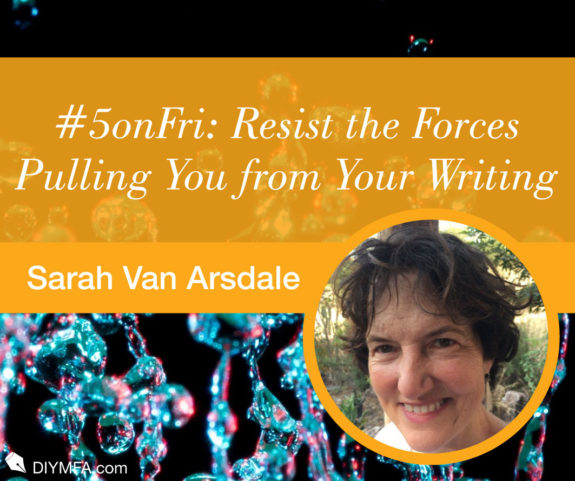One of the most frequent things that writers complain about is finding time to write. And then when we do find time to write, all of these distractions are calling us away from our writing. Today, guest poster Sarah Van Arsdale shares her advice for how to resist and get some work done.
1. Shut off the phone and . . . find the time to write.
You know that little button on the side of your phone? Push it, and a startling message will appear: “Slide to power off.”
Really, it’s okay. You can turn it off. Not just the ringer, the whole damn thing. It’s exhausted. Let it have a rest.
It’s now longer a gateway to the rushing, compelling, demanding world outside your writing; it’s now your magic concentration device.
2. Shut off the internet and . . . find the time to write.
See, at the top of your screen, the little triangle thing that means you’re connected? Click on that, and shut it off.
Feel the flicker of anxiety when you do this; what if you miss something? What if some further catastrophe is happening in our world and you’re not the first to know? What if your friend Marie has a new hairdo she’s showing off on Facebook? How can you bear to not be connected?
Instead, you’ll be connected to your writing, your work, your self.
Wait few seconds, and you’ll feel a wash of relief: You don’t need to know whatever is happening in the world right now.
What you need to do is get to work, and write.
3. Close the door and . . . find the time to write.
Tell your partner/spouse/mother/child not to interrupt you until you come out. Some people (children, in particular) respond better to this if you give them a time, like “I’ll be out in an hour,” instead of “I’m not coming out until I get some depth to this character.”
This may help you, too: setting a timer for 40 minutes can alleviate some of the anxiety of writing. You know there’s an end in sight.
If you don’t have your own room with a door, tell the people around you that when you’re wearing your Yankees ball cap, or when you’re wearing your headphones, or when you’re sitting in a particular chair, that’s your writing time, and you are not to be disturbed.
4. Don’t even look at your email before sitting down to write.
No, not even a peek. Not even to check and see if there’s something from the publication you submitted to yesterday.
Take a deep breath.
If there is something of interest waiting in your email, desperately banging on the bars of the cage so you’ll read it, it’ll still be there in a couple of hours, or 15 minutes, or however long you’re going to give yourself to write.
I know these first four may seem impossible; what helps me is to think of someone in a job where they really cannot be disturbed. Because we’re writers, we’re often at the computer, phone at our side, appearing available. But we’re not. We’re writing.
You wouldn’t want the surgeon, scalpel in hand, to suddenly need to check the airfares to Mexico, or to answer a call about this weekend’s plans.
A low-wage worker in a big-box store can’t suddenly decide to do a little job search on their phone, or see if an important email has come in with a coupon from Bed Bath and Beyond.
You are the surgeon. More to the point, perhaps, you are the low-wage worker.
5. Once you’re sitting in front of the work, let yourself relax into the bubble you’ve created.
If your mind is still flying all over the place (pandemic, climate collapse, racism…who can blame you for feeling anxious and distracted?), just sit at your desk for a moment.
Look around you, name five things you can see (clock, plant, other pair of reading glasses), then four things you can feel (the fabric of your shirt, the floor beneath your feet), three things you can hear, two things you can smell, and one thing you can taste.
And then, get to work.

Sarah Van Arsdale’s first poetry chapbook, Taken, is forthcoming at the end of this month from Finishing Line Press in October 2021. Click here to order a copy. She is the author of four books of fiction and a single book-length poem, titled The Catamount (Nomadic Press, 2017), illustrated with her watercolors. Her other books are: Toward Amnesia, In Case of Emergency, Break Glass, Grand Isle, and Blue, winner of the 2002 Peter Taylor Prize for the Novel. Her poetry, fiction, and essays have been published in widely in literary magazines. In addition to teaching in the Antioch/LA low-residency MFA program, she has taught with Art Workshop International in Assisi, Italy, at New York University, and with Bar Ilan University in Tel Aviv. More of her drawings, short films, and writing can be seen at sarahvanarsdale.com







